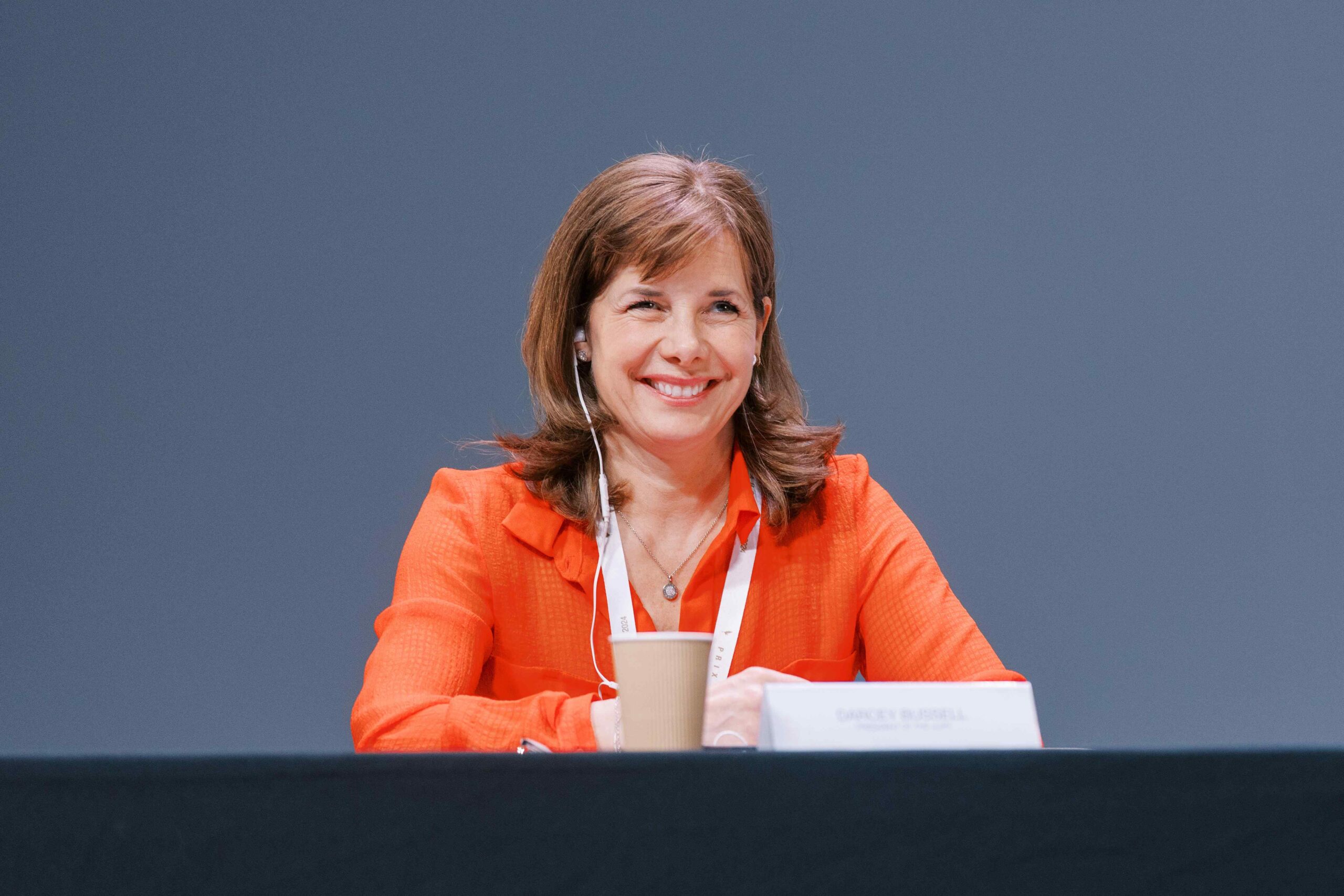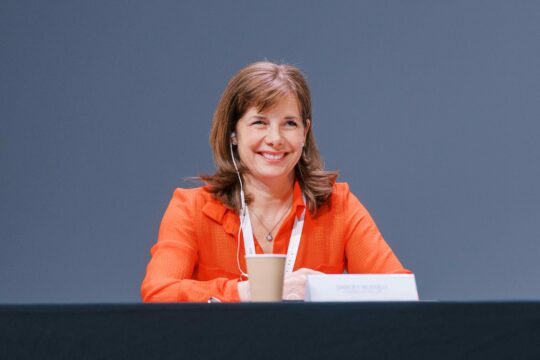Dans les moments fugaces entre l’agitation des coulisses et la lumière radieuse du prestigieux Prix de Lausanne, Darcey Bussell, qui incarne la grâce, la gentillesse et une aura royale, a généreusement accepté un « Behind the Curtains » improvisé de 15 minutes. Cette interview donne un aperçu rare de ses réflexions sur la compétition et le monde du ballet1.
In the fleeting moments between the backstage hustle and the radiant spotlight of the prestigious Prix de Lausanne, Darcey Bussell—embodying grace, kindness, and an aura of regal poise—generously accepted an impromptu 15-minute “Behind the Curtains” interview, providing a rare glimpse into her thoughts and reflections on the competition and the broader world of ballet.
Returning to Lausanne today, where you were a Prize Winner in 1986, what does this competition mean to you personally now as you take on the role of jury president?
I have been on a jury before so that’s been very helpful. Ever since I was young I’ve been fascinated in the progression of the competition and where it keeps moving to because it sets such a great kind of example, I think, because competition in Art form can always be a bit controversial. But I think they set a very good standard where the whole experience in that process is kind of more important than the awards.
I think with what I have seen and followed and experienced it really is true to that.
I feel really honoured to represent this Art form and what the Prix de Lausanne can do to create that awareness for young talent coming through and its importance in that it follows through on those young individuals so it’s very exciting to come back and see that all happen again and how they just keep taking the next step up. It is also exciting to see the improving quality of the young candidates as well, because we have to be aware of the pressures, they’re under, with social media and all the stuff that is now laid on top, also now it’s live broadcast and there are all these extras which it wasn’t when I was growing up.
The Prix de Lausanne has always been a symbol of excellence in the dance world. In your view, have the criteria or expectations evolved over the years?
I don’t know, I think the criteria maybe in the more contemporary modern creative works, has evolved. But then when I was at school, we didn’t do modern or contemporary dance.
Did you not?
No.
I was lucky, I did do it in Stage school but in my vocational Ballet school, the Royal Ballet School, when I was there, we didn’t do it. It came in later but it’s important in that, it obviously comes from new choreography, choreographers wanting more from a classical dancer and being able to adapt and be more, I suppose, I want to say resilient, but more diverse in their movement and understanding in that feeling.
But I also think it has made an improvement on the classical form to keep contemporary as a very strong part of a dancer’s training. Because what they learn through contemporary and what they can contribute then to their classical dancing it does give them a great confidence ,and an ability that they kind of get “ Wow, I can do this, and this and this” Instead of you know “ I’m just working on one thing”. So not that singular sort of focus, because with the world we are in now, we have to be very open. So, I think that has evolved and has made a big difference to the dancers and their experience of going professional and their expectations, it really has helped them.
Having portrayed many iconic roles in classical ballets, which is your favorite, or which role do you feel particularly connected to?
Well, it’s funny because I think if you asked most professional dancers they would say they enjoy a challenge, so being given roles that weren’t necessarily predictable for their style or their look, so I always really enjoyed that because I was always put in the box of being a tall, physical dancer. Could I be a Giselle? Could I be a 14 year old Juliet? But the most fulfilling… it’s so difficult. Umm. I think when there’s an emotional attachment, it really helps and there was one ballet in particular where I felt that I reached a different level in my understanding of what can be projected to the audience.
Did you dream when you were a little girl of a specific role?
No, no, I had none of those dreams.I developed quite slowly but there was one ballet, when I first got into the Royal Ballet after I’d been in a touring company, I did “ Song of the Earth” and that was a big wake-up, to really absorb the role and forget about the audience. Because I think as an artist, you’re always thinking of how the audience are feeling and taking it and it was the first time I was able to forget that anybody was there, not that you’re internal.
You mean to be able to focus more on what you were doing and expressing even more of yourself?
Yes, exactly that, to focus.
The focus was different and that was very rewarding. I love so many different choreographers and works, they all have something different, don’t they? But I think that was the first time I was conscious of it.
Your career has been marked by diversification, from dancing to writing and beyond. Has writing always been another form of expression for you, a pleasure, or an outlet?
No, No.
I’m very dyslexic. So that was very hard for me, but I understood that in engaging art, you have to use many mediums and I knew that was an important part of a young child’s experience and I thought why isn’t there more on dance for the very young? If they have that natural instinct to want to move to music, and I think that should be embedded in all sorts of education. Transcending through different techniques how you engage dance, it should be cross curriculum.
In my experience in England people tend to not put you too much in a box, so if you’re more versatile and have plenty of interests, like dancing, or writing or singing, or even fashion it’s a bit easier, do you think this is the case?
I don’t know, I think it’s very personal on how you feel, doing it. I was sort of planted in it, and I was like OK, find my way as I was doing it, but I also realized that I had a purpose, so I felt a responsibility. I thought I should use my name, what I’ve created and make the most of it.
I wouldn’t say that it was my thing to do, as in I thought that’s what I was going to do after I finished my career as a classical dancer, but I have to say, I loved taking those risks.
I think that’s in you. If the opportunity came around, I would just jump in.
As a professional dancer, transitioning to a new phase of life can be challenging. What advice would you offer to dancers to best prepare for pivotal change ?
Well, I think they have the tools already but they don’t realise it.
I think they have that ability to change because they’re constantly doing that as an artist. Constantly trying to find a different person within them, to project a different character, so in a way, the tools are there.
They just have to discover it by themselves?
They have to take that step! In a way, sometimes a little push is quite good.
I think being daring is part of our profession and so I hope they can keep that going. With me there were lots of inspirations that I took from other dancers that had stepped out of their bubble of the dancing world.
Who for example?
I suppose with television and dance being filmed more, I saw a lot of more people being more comfortable talking about dance and its inspiration and all of that, and I thought well we can take that further, can’t we?
We should be part of more programming so dance is out there and I think that has become certainly much more popular, especially in England. We’re very lucky, we’ve used dance to project a celebration of dance and I think we’re lucky there. We have that but then we don’t use it in society, so I’m always like umm there is a kind of missing gap. There’s a missing link and we need to fix that link.
The Prix de Lausanne is renowned for nurturing young talent. In your opinion, how significant is this competition in shaping the careers of young dancers, and how can it impact their artistic future?
It’s transformative, you know. Admittedly, at the time I didn’t have this ( showing her mobile phone) I was very unaware of the amount of talent and the amount of expertise.
Don’t you think this was actually a good thing?
No, I think you really need to be aware, because you’re aspiring always to be better but it’s so inspiring to see others that want the same thing that you want. So, it gives you another push and it also made me feel like I had to do more, in order to feel comfortable because there is so much out there and I thought wow this is so exciting. So, it kind of gave you that exciting step forward, I never felt, well obviously I was fortunate, and I won a Prize, but I never felt “ Oh, everybody is so much better”.
It wasn’t that… You know there’s always going to be someone better.
But it was the energy from all the candidates that you feel carried by this need to do it.
And that was a big wake-up call, that there were so many others that wanted the same and I thought wow! That is even more exciting art form than I realised! You feel driven by it and feeling that there’s something special going on.
Did you feel this already back then?
Yes, and it wasn’t just a tradition where the fortunate got to do it and it felt much more level, everybody on the same platform.
Having judged both ‘Dancing with the Stars’ and the Prix de Lausanne, can you share any amusing similarities or contrasts between these two very different dance worlds?
Dancing with the Stars is in between art and sport and the ballroom and Latin world is very much based on a competitive marking system and I feel very fortunate that I come from an art world and the Prix de Lausanne is very much about artistry. Obviously, we’re perfecting technique from a young body and how do you do that but always it’s how you give and how you represent a narrative and a feeling.
We’re not a brand, we’re not commercial and I think there’s a big difference and it’s kind of refreshing because I worry that society is so obsessed with the whole commercial and branding of the idea of a money-making machine. We want to stay true to the art and why it exists and what it gives to the public and the people involved. It shows something real, from the soul.
Dancing with the Stars is clever because you’re watching somebody step out of their box, out of their comfort zone and they’re celebrities, so you’re thinking wow it is amazing that they feel that driven, to be watched by millions, but more that the experience is good. So it is celebrating dance but then it’s commercial.
With your extensive experience in the dance world what essential advice would you give to the young dancers participating in the competition this year?
Don’t try to be anybody else but you.
I know we get influenced and that’s important but keep focusing on yourself, on what you want to achieve instead of what you think other people want from you.
Cécile Beaubié
1er Février.2024
1Traduction française disponible bientôt sur notre site
La rédaction de Résonances Lyriques remercie Satine pour son aimable collaboration.



